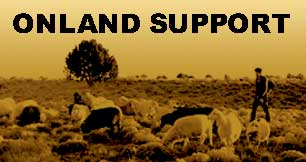Roberta Blackgoat: Matriarch of Big Mountain and the struggle against relocation
April 25, 2002 by pathfinder
Filed under Voices from the Land
By Marley Shebala
The Navajo Times
4.25.02
WINDOW ROCK, Az. – Big Mountain has become an international name even though it’s a very remote area on the vast Navajo reservation.
Roberta Blackgoat, an elder who has lived all her life on Big Mountain and more specifically in an area on Big Mountain called Thin Rock mesa, where the roads are dirt and impassable when it rains or snows, helped put Big Mountain on the map by traveling around the world.
Blackgoat, whose birthday is unknown because she was born in the traditional Navajo way, took a final trip to San Francisco.
Family members on Wednesday said Blackgoat, who may have been in her early 80s, passed away at 7:45 p.m. on Tuesday.
Blackgoat was in San Francisco to attend a memorial for Arlene Hamilton, the coordinator of the Weaving for Freedom Project.
The family was still discussing burial arrangements at press time on Wednesday.
President Kelsey Begaye on Wednesday said, “It was with great sadness that I learned of the passing of Roberta Blackgoat.
“Roberta was an elder and spokesperson for the Big Mountain community on the HPL (Hopi Partition Land).
“Through the hardships of the Navajo-Hopi Land Dispute, she always maintained her dignity and her gracious spirit.
“It was a privilege to know her. She set an example in her personal life that should be a standard for us all.
“No matter the difficulties she remained true to her family, her community, her culture and her spiritual beliefs.
“Roberta was not only a respected elder within her community, but also an internationally known advocate for indigenous, civil and human rights.
“My condolences and that of the entire Navajo Nation go out to Roberta’s family. She was and will continue to be an inspiration to us all,” said Begaye.
In an Aug. 2, 2001, Internet message “To all supporters,” Blackgoat thanked everyone for helping her obtain signatures on petitions for Congress to stop the federal relocation of Navajo people from HPL and Peabody Coal Company’s use of water from under Black Mesa to slurry coal from Black Mesa to a coal-fired generating station in Nevada.
“We demand that you (Peabody) stop destroying the Mother Earth’s liver and blood; the coal and the water,” she wrote.
Blackgoat never gave up hope that the federal laws that Congress passed to relocate her and other Navajo people from their ancestral homes would be repealed.
But the more than 30 years of struggling to first stop the strip mining of Black Mesa and then federal relocation took its toll on Blackgoat, who started having health problems several years ago.
But that did not stop her from attending several days of the trial of her neighbors, three elders and two young women, whom the Hopi Tribe arrested and charged for trespassing on the HPL.
The five women were acquitted.
Blackgoat in her Aug. 2, 2001, message also shared the following story with her supporters.
“Last week, Joseph Shelton, of the (U.S.) Relocation Commission came to my door wanting to know whether I was moving or relocating.
“I told him I have no idea to move out. My ancestors sat here and there and there and there. We don’t know how thick the soil is with their (our ancestors) bones are, so the land is out of the ancestors turned to soil.
“We don’t know how many centuries they have been sent by the great spirit here. So that’s why I can’t leave this ancestral land. Their graveyard is our roots.”
My prayers are always with you, Roberta Blackgoat.


